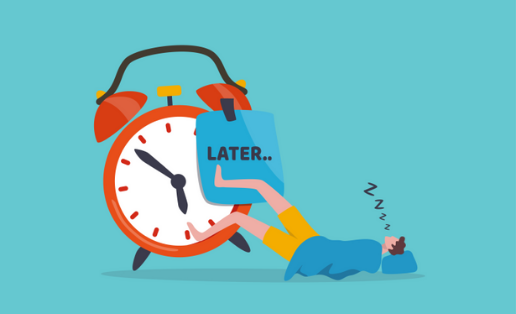
We still have time, I'll do it tomorrow, I'll do it later, the deadline is not up until next week. These are some of the phrases I use a lot.
Procrastination is something I'm used to. I'll be doing everything and anything except the work that needs to be done but then comes the day of submission, the day of the exam or the presentation. Then starts the fear of not completing the task on time, of not being perfect, the fear of failure, the regret oh I should've studied for that extra hour, I should've started on the project before, why did I sleep early I should have been awake last night and make this last-minute work which I know was solely my fault to try and carve it to perfection. The stress, the anxiety and ten cups of coffee, a headache tablet and loss of sleep later I'll be satisfied with the result but still be thinking what I could do better. Why am I always so stressed, where did I go wrong when the the answer is pretty clear–
STOP PROCRASTINATING
PERFECTIONISM IS THE MOTHER OF PROCRASTINATION

Procrastination and perfectionism often go hand in hand. Perfectionism leads to procrastination. And self doubt even before starting the work all the what-if questions in our head often makes it hard to perform, we start with these great ideas, all the plans organised about what to do, how to do it but as the deadline is approaching even the simplest task seems unrealistic. Perfectionism makes us think everything is either perfect or a failure which can be very problematic.
So if you are someone like me who wants everything to be perfect but procrastinates a lot then this is for you “Everything can not be perfect” and that's okay, what's important is that you tried. So what to do to overcome procrastination? Here are a few things that I have been trying and that is working for me pretty well and might help you out as well -
1. Break down your tasks
If you are someone to make to-do lists or have a planner make a habit of breaking down your tasks into smaller tasks. We often tend to make an unrealistic planner overloaded with tasks which later leads to being overwhelming and stresses us out and we end up doing nothing so having smaller tasks that are doable eases our mind to not go into panic mode.
2. Reward yourself
After completion of every task, small or big, always reward yourself and appreciate the effort that you put into it.
3. Brain dump
When you are working on something and your mind wanders somewhere else or you remember something like “I should text this person back” or “check that movie review” then take a paper and write all those thoughts on it then get back to your work.
4. Time blocking
When you feel like not doing a certain task at the moment, make a time block for it later in the day and make sure to complete it in that time.
5. Forgive yourself
It's okay to have setbacks. It's okay if you haven't achieved your expected results or failed at something. That's the life we fall but get up and try again we learn from our experiences. So don't be so hard on yourself and try again and again until you achieve that goal, never stop trying and believing in yourself.